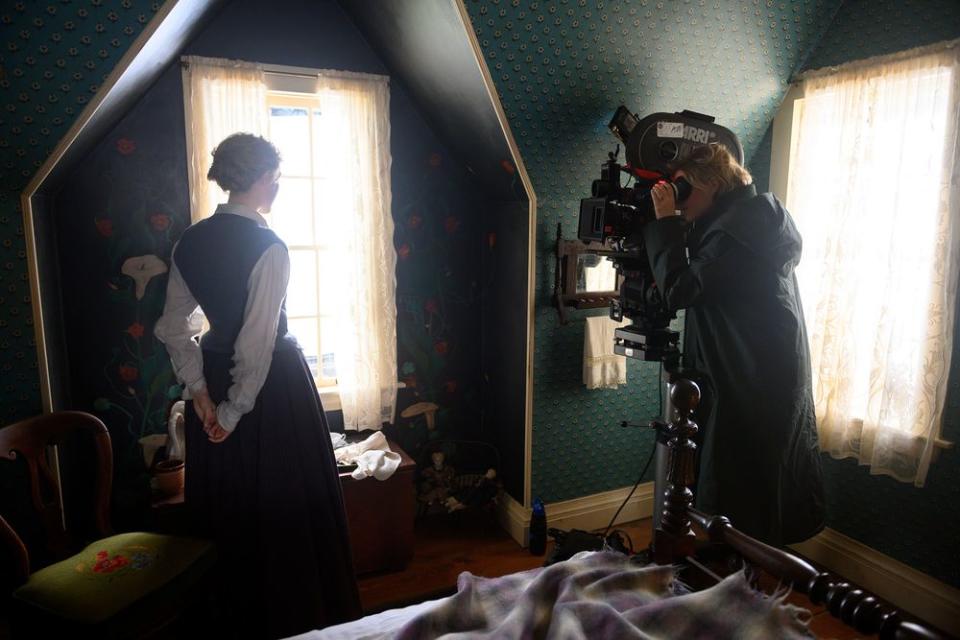Greta Gerwig on her 30-year journey to directing Little Women: 'It feels fated'

Back in October, Greta Gerwig had the chance to participate in a most bittersweet tribute. At the 2019 Governors Awards, she was joined by Jane Campion (The Piano) to present the final Honorary Oscar of the night to Lina Wertmüller, the first female director ever nominated for an Academy Award (for 1976’s Seven Beauties). By the time the legendary Italian filmmaker accepted her trophy, 60 percent — a clear majority — of all the women ever nominated for the Best Director Oscar were on the same stage.
Gerwig is the most recent woman to be nominated, for her solo directorial debut, Lady Bird (2017). And she may become the first two-time nominee ever for her follow-up, Little Women, riding high after a very strong Christmas opening at the box office and receiving rave reviews. Golden Globe snubs be damned, the adaptation of Louisa May Alcott’s classic is gaining serious awards momentum.
It’s a special, heavy moment for Gerwig, as she tells EW in our Awardist interview; its historical significance is undeniable. She’s said that growing up, her hero was Little Women’s indefatigable heroine Jo March, and that now as an adult, her hero is Louisa May Alcott. And so it feels strange for Gerwig that her deeply personal Little Women — a movie she’d been wanting to make “cumulatively” for 30 years — is landing when she’s 36 years old: After all, when the original Little Women published 151 years ago, Alcott, too, was 36 years old. Gerwig calls it one of many “strange coincidences” that became apparent in the process of making the movie. And it’s fitting, as well — another meta-layer of authorship weaved into a film that explores the meeting of fiction and autobiography in the art of creation.
“I feel such an enormous debt of gratitude to Louisa May Alcott, to Lina Wertmüller, to Jane Campion, to Agnes Varda — these godmothers who’ve come before us,” Gerwig says, after reflecting on the Governors Awards. “It is not lost on me, what this moment is. It’s all very cumulative and very moving. It feels fated in a very wonderful way.”

Gerwig pitched herself as the person to make the new Little Women the moment she heard it was being developed. This was before Lady Bird established her as one of Hollywood’s most exciting filmmakers. But she convinced producer Amy Pascal and the team to take a crack at the script. “By the time Lady Bird came out, they came back around and said, ‘Would you like to direct this?’ — which is what I’d always wanted to do and always planned on doing, even though they didn’t know that,” she says wryly. “The way I write is always with an eye to direct. It’s always the blueprint for me, to direct it. It didn’t feel like a choice. It felt like, as soon as I knew it was possible, it was inevitable, because it was something I wanted for so long.”
After rereading Little Women some time ago, Gerwig was shaken by the story’s modernity. She located a story about “ambition and women and money and art,” themes which ground and fuel her film. Indeed, with the help of a smart timeline-shifting structure and the incorporation of Alcott’s letters and diaries, Gerwig zeroes in on the choices each March sister makes from childhood to adulthood — whether it’s for marriage, or wealth, or creativity, or some combination. “That choice — that being an agent in your own life — is so rare in fiction of that time, and I think enabled women to see themselves as not beings that are acted upon, but actors themselves in their own lives,” the writer-director says. “I wanted to bring that out.”
This comes through most clearly for Amy — “a completely unsung hero,” in Gerwig’s view. In the hands of Florence Pugh, the character receives a galvanizing update that feels both faithful to Alcott’s original conception and radically different from past interpretations. Gerwig achieves this through true affection for the character. Indeed, the list of things she loves about Amy runs long: how she’s a “delicious” spoil for Jo in childhood, her “ability to see the constraints of the world she lived in,” that “she speaks all the desires she has.” Gerwig continues, “She’s so good at saying what she wants. Women have a lot of guilt about saying what they want.”
As our interview, taking place on a drizzly November afternoon in Los Angeles, progresses, Gerwig shares a few more of her favorite things: Patti Smith, Elena Ferrante’s Neapolitan Novels, the notion of a sesquicentennial celebration. (We call this 151st anniversary year of Little Women close enough.) And, of course, those aforementioned directors — legends in whose footsteps Gerwig is following. But she’s excited to look ahead, too — true to the spirit of Little Women, a story which has inspired generations of girls for over a century and will continue to do just that. “I care about women of all ages watching this, hopefully, and being excited,” Gerwig says. “But also I’m really excited for the girls who are 10 right now. They are going to hopefully inherit all of this and be able to keep exploding it more.”
Listen to our full interview with Gerwig below.
Related content:

